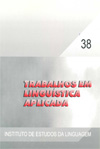Resumo
This work is a reflection about the possibility of considering the relation between Mother Tongue and Foreign Language from the point of view of the constitution of the subject Language. We take as a support for this reflection the unconscious Freudian hypothesis which presents a different concept of memory: according to Freud, the inscription of language in memory is a process of reading/writing of mnemic traces, whose simultaneous registrations in several systems do not allow for their inmediate recovery. The possibility of recovering mnemic traces depends necessarily on verbal expression and reading. Accordingly, if memory is to a great extent unconscious, another way of discussing the status of Mother Tongue unfolds: Mother Tongue does not represent an assuredness to the subject, since he/she canot say everything there. The idea of Mother Tongue as a place of certainty for the subject is then questioned. As a consequence of this hypothesis, it is added to the discussion the strangeness within the language as an organizing element which permits, in Mother Tongue/Foreign Language relationship, the displacement of the concept of otherness. The Foreign Language loses it status of strangeress - because it is different, and starts to be questioned from the point of view of a constitutive strangeness of the Mother Tongue itself. It must be stressed that Freud conceives memory and language only and above all as writing systems. It is not irrelevant to this work, once it is this coneption of language as a reading/writing system which gives us elements to question the condition of the Mother Tongue familiarity and the Foreign Çanguage foreignism.O periódico Trabalhos em Linguística Aplicada utiliza a licença do Creative Commons (CC), preservando assim, a integridade dos artigos em ambiente de acesso aberto, em que:
- A publicação se reserva o direito de efetuar, nos originais, alterações de ordem normativa, ortográfica e gramatical, com vistas a manter o padrão culto da língua, respeitando, porém, o estilo dos autores;
- Os originais não serão devolvidos aos autores;
- Os autores mantêm os direitos totais sobre seus trabalhos publicados na Trabalhos de Linguística Aplicada, ficando sua reimpressão total ou parcial, depósito ou republicação sujeita à indicação de primeira publicação na revista, por meio da licença CC-BY;
- Deve ser consignada a fonte de publicação original;
- As opiniões emitidas pelos autores dos artigos são de sua exclusiva responsabilidade.
Downloads
Não há dados estatísticos.

